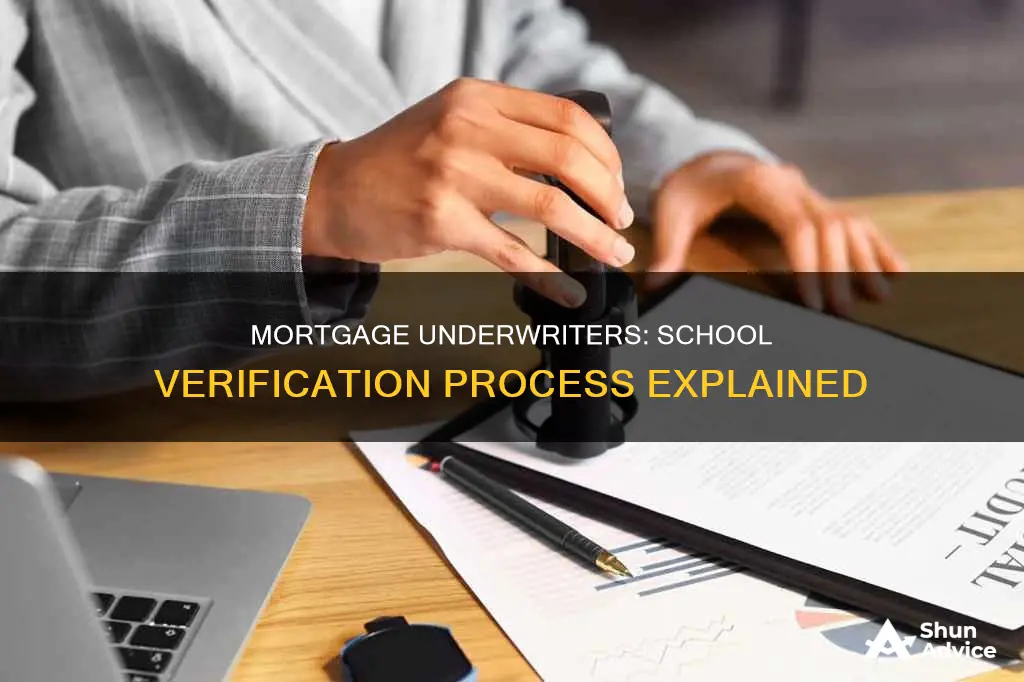
The mortgage underwriting process is a crucial part of the loan approval process. It involves a mortgage underwriter taking a detailed look at your finances and credit history to determine your eligibility for a loan. This includes verifying your income, assets, debt, credit report and property details. The underwriter will also look into significant life events such as recently graduating from school, switching careers, or starting a new business. The process can be tedious and requires a lot of documentation, including pay stubs, tax returns, W2s, bank statements, and more. Ultimately, the underwriter decides whether your loan will be approved and works with you to ensure you've submitted all the necessary paperwork.
| Characteristics | Values |
|---|---|
| Purpose | To determine whether a home loan is approved |
| Who | An individual employed by the lender |
| What they do | Take a detailed look into your finances before making a credit decision on your loan |
| What they verify | Income, assets, debt, credit report, property details, employment status |
| Documents required | Pay stubs, W2 forms, tax returns, bank statements, profit and loss statements, balance sheets, business records, etc. |
| Time taken | A few days to weeks |
What You'll Learn

The underwriter will verify your income
The mortgage underwriting process is essential to verify income and determine whether a loan is approved. The underwriter will verify your income by examining your financial records and documentation. They will assess your income, cash reserves, investments, and debts to determine if you have adequate income to make your monthly mortgage payments. Most lenders follow the rule of thumb that your mortgage payments should not exceed 28% of your gross income.
To improve your chances of approval, you should be prepared to provide various documents, including pay stubs for the last two to three months, W-2 forms, tax returns for the previous two years, profit and loss statements, and bank statements. The underwriter will compare the income stated in these documents with the income you reported. They will also verify your employment status with your employer. If your income is dependent on bonuses and commissions, you will need to provide two years' worth of this income for it to be considered part of your total income.
If you are self-employed, the requirements are more challenging. You will typically need to provide two years of income from your business, as well as profit and loss sheets, balance sheets, and personal and business tax returns. Self-employed individuals may need to find alternative ways to prove their income, such as providing two years of tax returns, bank statements, and business records if they do not have a traditional employer. Underwriters may also consider significant life events, such as recently graduating from school, when evaluating your financial situation.
It is important to respond promptly to any requests for additional information and be upfront about your financial situation. Being transparent can increase your chances of loan approval. However, keep in mind that specific loan program availability and requirements may vary, so it is always best to consult with a mortgage advisor for personalized advice.
Unlocking Cash: Withdrawing from Your Mortgage
You may want to see also

They will also check your employment status
The mortgage underwriting process is essential to verify income and determine whether a loan is approved or not. The underwriter will also dive into significant events such as recently graduating from school, switching careers, or starting a new business. The amount of money loaned is usually substantial, so the verification process can be tedious and requires plenty of documentation.
Underwriters need to determine if you have enough income to make your monthly mortgage payments. They will also check your employment status and verify your employment with your employer. They will want to ensure that you have a steady source of income to pay your monthly mortgage premium. They will also ensure that you earn as much as you stated on your application to ensure you can repay the loan. If they find out that you lied or earn less than you stated, they will review your actual income to determine eligibility.
Most underwriters follow Fannie Mae and Freddie Mac guidelines, but standards may vary. To improve the chances of approval, you need to prepare pay stubs for the last two to three months, W2 forms, tax returns for the previous two years, profit and loss statements, and bank statements. They do this to check if your stated income matches the income reported. Things may get a little tricky if your income is dependent on bonuses and commissions. Underwriters will need to see two years' worth of bonus or commission income to consider it as part of their income.
The requirements get more challenging if you are self-employed. In that case, two years of income from your business is usually required, and in place of W2s, you need to prepare profit and loss sheets, balance sheets, and personal and business tax returns. It is not unusual for the underwriter to come back with questions about your submitted documents, so respond quickly and submit any additional information to make the process faster.
Removing a Spouse from a Mortgage: A Step-by-Step Guide
You may want to see also

They will review your credit history
Mortgage underwriters assess your credit history to determine your creditworthiness and ability to repay the mortgage. They will review your credit report, credit score and payment record. This includes how well you have made payments on, or paid off car loans, student loans and other lines of credit. They look for clues that will help them predict your ability to pay back what you borrow.
Underwriters will also consider your financial profile, including your income, assets, debt, cash reserves, investments and property details. They will review your employment, income, debt and assets. They’ll look at your savings, checking, 401k and IRA accounts, tax returns and other records of income, as well as your debt-to-income ratio. They want to see that you, and any co-borrowers, have the ability to make the payments both now and in the future.
Underwriters will also consider significant life events, such as recently graduating from school, switching careers, or starting a new business. They will also take into account the current market value of the home to ensure it serves as ample collateral for the loan. This assures the lender that they can recover the unpaid balance in the case of default.
To prepare for the underwriting process, it is important to have all the necessary documentation ready, including pay stubs, W2 forms, tax returns, profit and loss statements, and bank statements. If you are self-employed, you may need to provide additional documents, such as profit and loss sheets, balance sheets, and business tax returns. It is also crucial to be honest and upfront about your financial situation, including any missed payments or negative marks on your credit report.
Starting a Mortgage Field Inspection Business: First Steps
You may want to see also

They will assess your financial situation
The mortgage underwriting process is essential to verify income and determine whether a loan is approved. Underwriters will assess your financial situation by examining your income, assets, debt, credit report and property details. They will also review your liquid assets to ensure that if, for some reason, your income doesn't cover the cost of your mortgage loan, you have money tucked away that you can use to pay it. This includes checking your savings accounts to ensure you can afford the down payment and have enough money left over to pay your monthly mortgage premiums. They will also assess your credit history and score, including whether payments have been made on time and whether there are any accounts reflecting overdrafts or NSF charges, which could be indicative of financial mismanagement.
Underwriters will also verify your employment status with your employer and will usually want to see that you've stayed in the same position or field for at least two years before applying for a home loan. This ensures that you have a steady source of income to help you pay your monthly mortgage premium. They will also want to see that your income matches the income reported. If your income is dependent on bonuses and commissions, underwriters will need to see two years' worth to consider it as part of their income. The requirements are more challenging if you are self-employed, and you will usually need to provide two years of income tax returns, bank statements and business records.
The underwriting process can be lengthy and tedious, requiring plenty of documentation. It is beneficial to respond quickly to any queries and submit all necessary documents to make the process faster.
Zero-Down Mortgages: How to Sign Up and Get Started
You may want to see also

They will determine your eligibility
Mortgage underwriters are responsible for determining your eligibility for a loan. They do this by taking a detailed look at your finances and credit history to assess the risk of lending to you. This process is called underwriting. It involves verifying your income, assets, debt, credit report and property details. Underwriters will also consider any significant life events, such as recently graduating from school, switching careers or starting a business. The underwriter will decide whether a lender will approve your loan and work with you to ensure you've submitted all the necessary documentation.
To prove your income, you will need to provide documents such as pay stubs, tax returns, W2s and bank statements. If you are self-employed, you may need to provide additional documentation, such as profit and loss statements and business tax returns. Underwriters will also verify your employment status with your employer and check that your income matches the amount reported. They will also review your liquid assets to ensure that, if your income doesn't cover the cost of your mortgage, you have money tucked away that you can use to pay it.
Underwriters will also take into account your credit score and history. They will look at your payment history, credit usage and any derogatory events such as bankruptcies. They will also consider your assets, such as savings accounts, to ensure you can afford the down payment and have enough money left over for monthly mortgage payments. An appraisal of the property's worth is also conducted to ensure the amount being borrowed is in line with the value of the home.
The underwriting process can be lengthy and tedious, and it's important to provide all the necessary documentation to avoid delays. Being upfront and responsive can help streamline the process and increase your chances of loan approval.
Mortgage Bankers: Making Money through Loans and Interest
You may want to see also
Frequently asked questions
Mortgage underwriters do not verify school. However, they do verify income and employment.
You will need to provide documents such as pay stubs, W2s, tax returns, profit and loss statements, and bank statements. If you are self-employed, you may need to provide additional documents such as tax returns and profit and loss statements.
A mortgage underwriter works for the lender and takes a detailed look at your finances and credit history to determine if you qualify for a loan. They assess the risk and ensure that all the information provided is accurate.
The timeline varies widely and can be lengthy, depending on various factors, some of which may be beyond your control.







